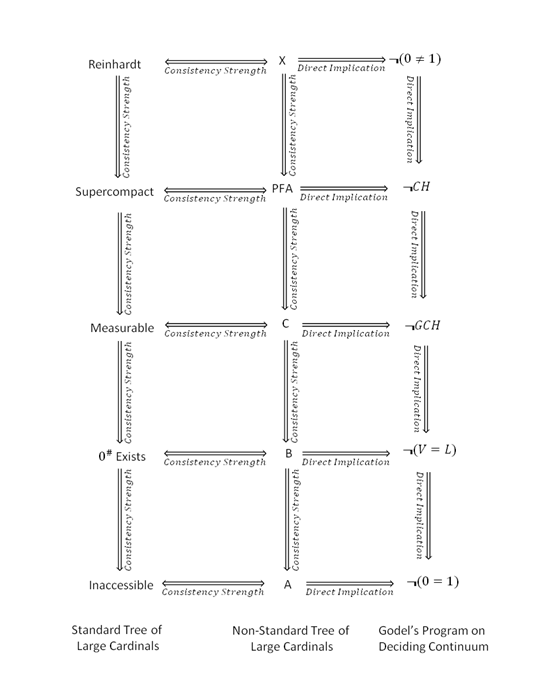We know $PFA$ implies $2^{\aleph_0}=\aleph_2$.
Q1. What does $PFA$ say about other values of continuum function? Does proper forcing axiom carry any further information about values of continuum function in other cardinals greater than $\aleph_{0}$? In the other words, is there any other known non-trivial result in the form "$ZFC+PFA\vdash 2^{\aleph_{\alpha}}=\aleph_{\beta}$" for some ordinals $\alpha , \beta$, or all other situations are consistent with $PFA$ like Easton's theorem in presence of some large cardinal?
In the direction of my previous question on Godel's program for deciding $CH$ and $GCH$ using adding large cardinal axioms to $ZFC$ and based on the impact of $PFA$ on $CH$ which is compatible with Godel's conjecture on refuting $CH$ and $GCH$ using large cardinal axioms. One can consider existence of another large cardinal tree in the shadow of the current standard tree of large cardinal assumptions including $PFA$ in a rank near supercompacts. (The equiconsistency of PFA and supercompacts is not proved yet but we assume it for straightforwardness of the below diagram.)
Maybe Godel's conjecture and program are true if we replace the standard tree of large cardinals with another tree with equiconsistent steps. Please note the following imaginary large cardinal ladder which includes two parallel trees of "large cardinal" assumptions:
Q2. Can we complete the middle part of the following ladder by some axioms like $A$, $B$, $C$, ..., $X$ which are equiconsistent with usual large cardinal axioms and also refute $CH$, $GCH$ and $V=L$ in direction of Godel's program?

Update. Using above approach to large cardinal axioms (inspired by success of $PFA$ in deciding $CH$ and its possible equiconsistency with existence of supercompact cardinals) we can restate Godel's program in deciding independent statements of set theory as follows:
For every independent statement $\sigma$ from $ZFC$ there is a (standard) large cardinal axiom $I$ and a statement $J$ (a non-standard large cardinal axiom) such that:
(a) Consistency of $ZFC+I$ implies consistency of $ZFC+J$.
(b) $ZFC+J$ decides $\sigma$ (i.e. $ZFC+J\vdash \sigma$ or $ZFC+J\vdash \neg\sigma$)
In the other words one can decide any independent statement of mathematics using some standard/non-standard large cardinal axiom.
Q3. Is the above thesis true?
I would like to thank Asaf Karagila for his comment in my previous question that was the main guide for this question.
